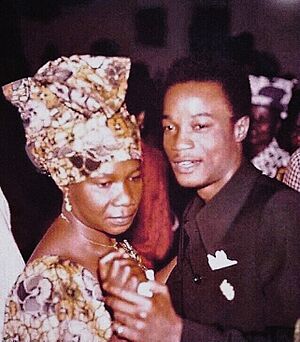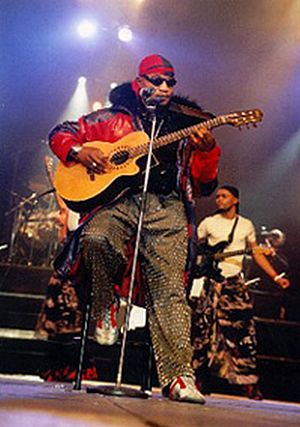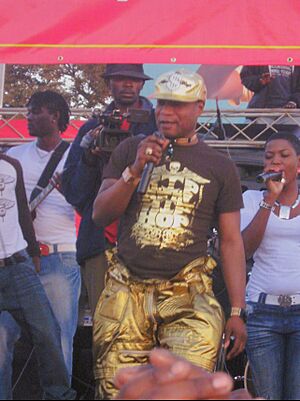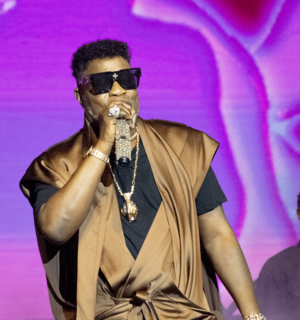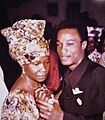Koffi Olomide facts for kids
Quick facts for kids
Koffi Olomidé
|
|
|---|---|
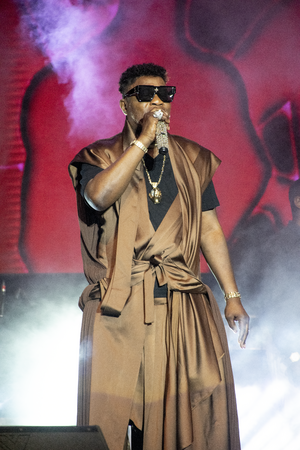
Olomidé performing in 2024
|
|
| Background information | |
| Birth name | Antoine Christophe Agbepa Mumba |
| Born | 13 July 1956 Stanleyville, Belgian Congo (now Kisangani, DRC) |
| Genres |
|
| Occupation(s) |
|
| Instruments |
|
| Years active | 1977–present |
| Labels |
|
Antoine Christophe Agbepa Mumba (born on July 13, 1956), known as Koffi Olomidé, is a famous singer, songwriter, dancer, and producer from the Democratic Republic of the Congo. He started the music group Quartier Latin International. Many people call him the "King of Ndombolo" because of his unique singing style and powerful voice.
Koffi Olomidé is seen as one of the most important musicians in Congolese and African popular music. His songs often talk about love, politics, technology, and success. He created a slower style of soukous music called tcha tcho. He also helped make a colorful fashion style called La Sape popular, along with another artist named Papa Wemba.
Koffi started his career by writing songs for other artists in the Zairean music scene. He became well-known in 1977 with his song "Princesse ya Synza," which featured Papa Wemba. In 1986, he formed his group, Quartier Latin International. This group helped many new artists become famous, like Fally Ipupa and Ferré Gola. His career grew even more in 1990 when he signed a deal with Sonodisc.
With a career spanning almost five decades, Koffi Olomidé was the first African artist to sell out the Palais Omnisports de Paris-Bercy in Paris. His work is also featured in the book 1001 Albums You Must Hear Before You Die. He has released 32 studio albums and 18 live albums, with over 300 songs.
He has won six Kora Awards, including four in 2002 for his album Effrakata. Forbes magazine has named him one of Africa's most influential celebrities. In 2013, he started his own music label, Koffi Central. In 2015, he released a huge album called 13ième apôtre with 39 songs. He has continued to release new music, including Nyataquance (2017), Légende Éd. Diamond (2022), Platinium (2024), and GOAT Intemporel, Vol. 1 (2025). In July 2025, he was ranked second on Billboard France's list of most-streamed Congolese artists in France.
Contents
- Early Life and Music Career Beginnings
- Childhood and Education
- Music Debut and Early Success
- First Albums: Ngounda and Lady Bo
- Introducing Tcha Tcho and Quartier Latin International
- Growing Fame and New Music
- Success with SonoDisc and Haut De Gamme
- New Dance Styles and International Performances
- Attentat and Effrakata Success
- Later Albums and Tours
- Danger de Mort and Bord Ezanga Kombo
- Recent Releases and Performances
- Music Style
- Personal Life
- Legacy and Awards
- Discography
- Images for kids
Early Life and Music Career Beginnings
Childhood and Education
Antoine Christophe Agbepa Mumba was born on July 13, 1956, in Stanleyville, which is now Kisangani in the Democratic Republic of the Congo. His parents were Aminata Angélique Muyonge and Charles Agbepa. His mother named him "Koffi" after a kind neighbor's husband. "Koffi" means Friday in the Akan language, as he was born on a Friday.
When he was seven, Koffi became known for a song called "Soso ameli Ngando," which means "the chicken has swallowed a crocodile." He grew up in Kinshasa. As a young person, he wanted to be a professional football player. However, he later decided to pursue music, inspired by artists like Zaïko Langa Langa and Franco Luambo.
His father told him he needed to get a degree if he wanted to be a musician. So, in 1974, at 18, he finished high school and went to the University of Bordeaux in France to study business. While at university, he learned to play the guitar and started writing songs.
Music Debut and Early Success
During school breaks in the mid-1970s, Koffi returned to Kinshasa. He began writing lyrics for different artists, earning the nickname "the most famous student in Zaire." He caught the attention of Papa Wemba. Koffi recorded his first song, "Onia," during a break in Kinshasa. He also wrote songs for Papa Wemba's group, Viva La Musica.
In 1977, he co-wrote "Princesse ya Synza" with Papa Wemba. In the following years, he released more songs like "Samba Samba." While making music during his free time, Koffi earned a bachelor's degree in business economics in 1981 from the University of Bordeaux.
First Albums: Ngounda and Lady Bo
After graduating, Koffi returned to Kinshasa but couldn't find a job. He then went back to Europe to look for work. In 1982, he returned to Zaire, and an old friend named Debaba suggested they form a music group called Historia Musica. Koffi was the president and a backup singer for this group. However, Koffi's time with Historia Musica was short due to disagreements.
Koffi then started working on his first solo album, Ngounda, which was released in 1983. He recorded it in Kinshasa and finished it in Brussels. This was his first experience in a professional studio. The album received mixed reviews. Koffi then released his second album, Lady Bo, in 1984, which featured King Kester Emeneya.
Introducing Tcha Tcho and Quartier Latin International
Koffi's third album, Diva, came out in 1985. This album introduced his unique music style called tcha tcho. This style is a slower, more emotional version of soukous music. It focuses on themes of love and relationships. Many artists copied this style, and it became very popular, especially with young women.
In 1986, Koffi formed his famous group, Quartier Latin International. From then on, he released his solo albums and Quartier Latin albums, often using the same musicians.
Growing Fame and New Music
In 1987, Koffi released his fifth album, Rue D'Amour. This album included songs about love and jealousy. One song, "Mosika na Miso," was a tribute to Claudien Likulia.
In 1988, he released Henriquet, named after that year's Miss Zaire. This album made Koffi very famous in many African countries. A Zairean TV station called him "the biggest current star of Zairean music." In August 1989, Koffi released his seventh album, Elle et Moi, which he dedicated to his daughter Minou. This album showed a more modern sound for his tcha tcho style.
Success with SonoDisc and Haut De Gamme
In 1990, Koffi released Les prisonniers dorment..., which sold over 100,000 copies worldwide. This album won awards for "Best Songwriter" and "Best Album of the Year" in 1991. Around this time, a compilation of his hit songs was released called Tcha Tcho, which became known as "soukous love."
In February 1992, he released his ninth album, Haut De Gamme. This album mixed tcha tcho, Kwassa kwassa, and Congolese rumba. The song "Papa Bonheur" became a huge hit in Africa and Europe. Haut De Gamme was even featured in the book 1001 Albums You Must Hear Before I Die, being the only Congolese album to achieve this.
On June 1, 1992, Koffi released Quartier Latin's first album, Pas de faux pas. He toured Africa to support the album and performed for presidents. In 1993, Koffi released Noblesse Oblige, which sold over 100,000 copies and was certified Gold. Fans of Koffi started calling themselves "koffiettes" and "koffiphiles."
In November 1994, Koffi released Quartier Latin's second album, Magie. This album did very well, even outselling some international artists. In December 1994, Koffi won two African Music Awards for "Best Male Singer" and "Best Video Clip."
New Dance Styles and International Performances
In 1995, Koffi released his album V12, which also sold over 100,000 copies and went gold. The song "Fouta Djallon" became a top hit. In 1996, he released an album called Wake Up with Papa Wemba to stop rumors of a disagreement between them.
In 1997, he released Ultimatum with Quartier Latin, followed by his own album, Loi, in December. Loi sold over 100,000 copies and went gold. The main song from the album, "Loi," became the signature song for the ndombolo dance, which became very popular across Africa.
On August 29, 1998, Koffi sold out the Olympia Hall in Paris. He was the first Congolese artist to do so since 1973. This concert was a big moment for African music. French media praised his performance, calling him the "undisputed current leader of Congolese music."
On November 7, he also sold out the Zénith de Paris. He performed in London and was nominated for a Kora Award. In June 1998, he performed at a sold-out show in Ouagadougou, Burkina Faso, for the Organisation of African Unity summit. In September 1998, Koffi won Best Male Artist of Central Africa at the Kora Awards.
In December 1998, Quartier Latin released their fourth album, Droit de Veto, which became a chart-topping hit and earned the band their first gold record.
Attentat and Effrakata Success
In February 1999, Koffi performed in Tanzania and Kenya. In August 1999, he announced plans for an album to honor the victims of the 1998 attacks on American embassies in East Africa. This album, Attentat, was released in December 1999 and sold over 100,000 copies, earning a gold record.
On February 19, 2000, Koffi made history by becoming the first African solo artist to perform at a sold-out Palais Omnisports de Paris-Bercy (now Accor Arena). Over 17,000 tickets were sold, and thousands more couldn't get in.
On December 26, 2000, Quartier Latin released their fifth album, Force de Frappe. This album quickly became popular on music charts and was followed by a tour in West Africa, Nairobi, Mombasa, and Paris.
Koffi started working on his album Effrakata while touring France and the United States in 2001. During this tour, his band sold out the Zénith de Paris on July 14. Effrakata was released on December 7, 2001, as a double album. It was a big success, selling over 180,000 copies and receiving gold certification. In November 2002, Effrakata won Koffi four Kora Awards, including Best Male Artist of Central Africa and Best Video of Africa. These awards helped him earn the nickname "Quadra Koraman."
Later Albums and Tours
Quartier Latin's sixth album, Affaire d'Etat, was released in 2003. It featured songs by various band members and won the Kora Award for Best African Group. The band supported the album with concerts in Paris and North America, including Los Angeles and New York.
After his North American tour, Koffi announced his next album, Monde Arabe. The title, a "Koffian" expression, means "eel under rock." The album was released in 2004 and mixed Congolese rumba with ndombolo. Monde Arabe also started a fashion trend called "Sabot Monde Arabe," which were decorated slippers.
In February 2005, Koffi performed with Quartier Latin for a Valentine's Day celebration in Kinshasa. He also performed in London and at music festivals in Senegal. In December 2005, Koffi received the Kora Lifetime Achievement Award in South Africa. He also released a two-song album called "Boma Nga N'Elengi."
Danger de Mort and Bord Ezanga Kombo
In September 2006, Koffi began recording Quartier Latin's seventh album, Danger de Mort. This album was released in October 2006 and was the last record for Quartier Latin, as several members later left the group. Koffi supported the album with live shows in Kinshasa and Paris.
In 2008, Koffi announced his new album, Bord Ezanga Kombo, which was released in August 2008. It featured 17 songs that blended tcha tcho and Congolese rumba. The album sold 60,000 copies in four months and achieved a gold record. To promote it, Koffi performed in Ivory Coast and Paris.
In September 2009, Koffi was supposed to perform at the opening of the 29th SADC summit but was excluded. In October 2009, Koffi performed in Kinshasa to honor Franco Luambo, a legendary musician. Later that year, he released the EP La Chicotte à Papa.
Recent Releases and Performances
In June 2011, Koffi's album Abracadabra was illegally copied before its official release. His producer decided to release the album early in January 2012 to fight the piracy. The album also faced accusations of being inappropriate by the Kinshasa censorship commission.
In May 2013, he started recording his album 13ème Apôtre after starting his record label, Koffi Central. He said this would be his 20th and final album. He saw himself as Jesus' "thirteenth apostle" and named the album accordingly. In October, Koffi was a guest on Lady Ponce's song "Devine," which won them an award.
In October 2014, Koffi was arrested by Kinshasa police for making fun of efforts to fight the Ebola virus. After his release, he released the EP Bana Zebola in June 2015. 13ème Apôtre was officially released on October 13, 2015, with 39 new songs. It sold over 22,000 copies in one day and 46,000 in a week. The lead single, "Selfie," became a huge hit online, with over a million views on YouTube in three weeks.
After a year-long break, Koffi announced a new album, Nyataquance, in 2017. He released the single on March 8, International Women's Day. The album was seen as Koffi asking for "forgiveness" from women. He also organized a Women's Day concert with Fally Ipupa.
Koffi's live album Le Live was released in 2018. His song "Papa Mobimba" quickly went viral on social media, starting a dance challenge. In June 2018, he released "Ba-esclaves," a song criticizing his critics, which also became very popular.
In March 2020, he released the song "Coronavirus Assassin" to encourage people to stay home during the COVID-19 pandemic in Africa. In November, Koffi was featured on Diamond Platnumz's song "Waah," which became the first Sub-Saharan African song to get two million views on YouTube in 24 hours.
Koffi was scheduled to perform in Paris in 2021, but the event was canceled due to the pandemic. In February 2021, he appeared on Nandy's song "Leo Leo." In April, he released "Mon Amour" with Cameroonian singer Charlotte Dipanda. In November 2021, Koffi received the Legend Award at the All Africa Music Awards. He also held concerts in Goma, DRC, to celebrate Quartier Latin's 35th anniversary, with money going to victims of attacks and disasters.
In March 2022, he collaborated with many artists on "Leopards Fimbu International," a song supporting the DR Congo national football team.
On November 25, 2022, Koffi released the first part of his album Légende Ed. Diamond. It has 14 songs mixing traditional Congolese rumba, ndombolo, and hip hop. The album reached number one on the French iTunes charts in the World Music category.
On February 3, 2023, Koffi made up with his former rival Félix Wazekwa, and they released a song together called "Eau Pure." In August, Koffi appeared on Diamond Platnumz's song "Achii," which quickly gained one million YouTube views in 24 hours.
In June 2024, Koffi released the second part of Légende Ed. Diamond, renamed Platinium. It has 43 songs and features guest artists like Soolking and Davido. In November, Koffi released "Le Boss Mourinho" for his son's birthday. In December, he performed in Mouila, Gabon.
On January 18, 2025, Koffi released "Eputsha Hippodrome," a remix of his 2004 song "Eputsha." This was a preview for his concert at Hippodrome de Vincennes on July 19. On January 29, Koffi and Cindy Le Cœur released a song snippet dedicated to the FARDC to support soldiers. On March 22, he released "Loi Hippodrome," a new version of his 1997 hit "Loi."
His project, which started as an EP, became a full 17-track album called GOAT Intemporel, Vol. 1, released on May 9, 2025. This album features new versions of his classic hits. On July 18, Koffi participated in the closing ceremony of the World Music and Tourism Festival in Kinshasa. The next day, he was a guest on Cindy Le Coeur's song "Poupiye." On July 22, Koffi ranked second on Billboard France's 2025 list of most-streamed Congolese artists in France.
Music Style
Koffi Olomidé's music style is rooted in the dance-focused soukous genre, which comes from traditional Congolese rumba. He created his own style called tcha tcho, a slower version of soukous with beautiful guitar melodies. Koffi said, "Music for me is not only to dance, to jump to. Music is also meant to make the heart vibrate." This new style changed Congolese music and influenced many artists.
Besides Congolese rumba, Koffi also uses elements of ndombolo, kwassa kwassa, R&B, Afrobeats, trap, salsa, and zouk in his music. His songs cover many topics, including love, politics, technology, and success. He is known for his powerful, deep voice and exciting stage presence. He often acts as an atalaku, a hype man who energizes the audience during instrumental parts of the music.
His album Diva was the first to introduce tcha tcho. Haut de Gamme showed his ability to mix genres, combining tcha tcho, kwassa kwassa, and Congolese rumba. Loi focused on Congolese rumba and introduced ndombolo, a more energetic soukous style. Attentat explored Afropop. Koffi has also experimented with other sounds, like salsa with Africando and zouk with Nayanka Bell. On Monde Arabe, Koffi addressed political themes, dedicating songs to the Arab world. His album Légende Ed. Diamond mixed Congolese rumba with trap music, with songs like "Biberon" talking about the challenges and strength of people in Congolese neighborhoods.
Personal Life
Family and Relationships
Koffi Olomidé has been married three times and has several children. He married his third wife, Aliane, in Paris in 1994, and they have three children. He has dedicated several songs to Aliane, including "Miss des Miss" and "Alidor." Their daughter, Didi-Stone Naïke, is a fashion model and social media personality. She has been featured on many fashion magazines and was named an ambassador for L'Oréal Paris and UNICEF.
Aliane filed for divorce in 2021, and it was finalized in October 2022. Koffi has publicly stated his commitment to Cindy Le Coeur, a long-time band collaborator. Didi-Stone has expressed strong criticism of Cindy.
Cindy Le Coeur
Cindy Le Coeur joined Koffi's group, Quartier Latin International, in 2007 as a singer. Koffi was impressed by her voice and gave her the nickname "Cindy Le Coeur" (meaning "Cindy the heart"). They often performed romantic duets together, leading fans to call Cindy Koffi's "stage wife."
In February 2024, Koffi confirmed that he and Cindy had been in a romantic relationship for years. He described their connection as very deep, saying, "She is no longer just an employee... She is me, I am her." In May 2024, Koffi released the song "Mama ci," a tribute to Cindy, calling her the "Queen of Love." In August 2024, a video of them on a plane showed Cindy wearing a gold ring, leading to rumors of marriage. These rumors continued in April 2025 with a TikTok video that seemed to show a wedding celebration, but no official confirmation has been made.
Political Activities
In 2020, Koffi showed interest in becoming the chief of staff for Congolese president Félix Tshisekedi. In July 2021, he became an executive member of a political party called the Alliance des Forces Démocratiques du Congo (AFDC).
On February 9, 2022, President Tshisekedi appointed Koffi as a cultural ambassador for the nation, giving him a diplomatic passport. He was given the task of representing Congolese culture around the world. In March 2024, Koffi announced he would run in the senatorial elections but later withdrew, saying the process was unfair.
Legacy and Awards
Koffi Olomidé is one of the most popular African musicians ever. He has helped many new artists become famous, especially those who started in his Quartier Latin group, such as Soleil Wanga, Bouro Mpela, Fally Ipupa, and Ferré Gola.
He is one of the best-selling artists in Africa. He has won six Kora Awards, including four in one night for his album Effrakata, which is a unique achievement for an African artist. He is also the only Congolese solo artist whose work is featured in the book 1001 Albums You Must Hear Before I Die.
| Year | Event | Prize | Recipient | Result | Ref. |
|---|---|---|---|---|---|
| 1994 | Africar Music Awards | Best Male Singer | Himself | Won | |
| 1994 | Africar Music Awards | Best Music Video | "V12" | Won | |
| 1998 | Kora Awards | Best Male of Central Africa | Himself | Won | |
| 2002 | Kora Awards | Best Male of Central Africa | Himself | Won | |
| 2002 | Kora Awards | Best Video of Africa | "Effrakata" | Won | |
| 2002 | Kora Awards | Best Arrangement of Africa | Quartier Latin International | Won | |
| 2002 | Kora Awards | Jury Special Award | Himself | Won | |
| 2002 | Association des Chroniqueurs de Musique du Congo | Best Album of the Year | Effrakata | Won | |
| 2002 | Association des Chroniqueurs de Musique du Congo | Best Songwriter-Composer | Himself | Won | |
| 2002 | Association des Chroniqueurs de Musique du Congo | Best Orchestra | Quartier Latin International | Won | |
| 2002 | Association des Chroniqueurs de Musique du Congo | Best Song | "Effervescent" and "Gros Bébé" | Won | |
| 2002 | Association des Chroniqueurs de Musique du Congo | Best Star | Himself | Won | |
| 2002 | Association des Chroniqueurs de Musique du Congo | Best Musical Artist | Himself | Won | |
| 2005 | Kora Awards | LifeTime Achievement Award | Himself | Won | |
| 2007 | IRAWMA Awards | Best Soukous Entertainer | Himself | Won | |
| 2009 | IRAWMA Awards | Best Soukous Entertainer | Himself | Nominated | |
| 2014 | Kundé d'Or | Best Collaboration | "Devine" (with Lady Ponce) | Nominated | |
| 2017 | Canal 2'Or | Best African Artist | Himself | Nominated | |
| 2021 | Prix Lokumu | Best Collaboration | "Ndoto" (with Majoos) | Won | |
| 2021 | AFRIMA | Best Duo in African Contemporary music | "Ndoto" (with Majoos) | Won | |
| 2021 | AFRIMA | Best Male in Central Africa | Himself | Nominated | |
| 2021 | AFRIMA | Best African Collaboration | "Waah" (with Diamond Platnumz) | Nominated | |
| 2021 | AFRIMA | Best Duo in African Dance or Choreography | "Waah" (with Diamond Platnumz) | Nominated | |
| 2021 | AFRIMA | Song of the Year | "Waah" (with Diamond Platnumz) | Nominated | |
| 2021 | AFRIMA | Legend Award | Himself | Won | |
| 2021 | HAPA Awards | Legendary Award | Himself | Won | |
| 2023 | Les Congolais de Lille | Prix d'honneur | Himself | Won | |
| 2024 | Mundi Music Awards | Best Legendary Artist of the Year | Himself | Won |
Discography
Solo Albums
- Ngounda (1983)
- Lady Bo (1984)
- Diva (1985)
- Ngobila (1986)
- Rue D'Amour (1987)
- Henriquet (1988)
- Elle Et Moi (1989)
- Les Prisionniers Dorment... (1990)
- Haut De Gamme (1992)
- Noblesse Oblige (1993)
- V12 (1995)
- Loi (1997)
- Attentat (1999)
- Effrakata (2001)
- Monde Arabe (2004)
- Boma Nga N'Elengi (2005)
- Swi (2006)
- Bord Ezanga Kombo (2008)
- La chicotte à Papa (2009)
- Abracadabra (2012)
- Bana Zebola (2015)
- 13ième Apôtre (2015)
- Nyataquance (2017)
- Légende Ed. Diamond (2022)
- Platinum (2024)
- GOAT Intemporel, Vol. 1 (2025)
Albums with Quartier Latin International
- Pas de faux pas (1992)
- Magie (1994)
- Ultimatum (1997)
- Droit de véto (1998)
- Force de frappe (2000)
- Affaire d'état (2003)
- Danger de mort (2006)
Collaborative Albums
- 8è Anniversaire (with Papa Wemba, Viva la Musica) (1983)
- Olomidé et Yakini Kiese (with Yakini Kiese) (1985)
- Aï Aï Aï La Bombe Éclate (with Rigo Star) (1987)
- Glamour (with Duc Hérode) (1993)
- Wake Up (with Papa Wemba) (1996)
- Sans Rature (with Didier Milla, Madilu System, Papa Wemba) (2005)
- Olomidé et Fafa de Molokaï (with Fafa de Molokaï) (1987)
Live Albums
- Live à L'Olympia (1998)
- Live à Bercy (2000)
- Koffi chante Tabu Ley (with Tabu Ley Rochereau) (2010)
- Koffi chante Lutumba, vol. 1 (with Simaro Lutumba) (2011)
- Bal des Vacanciers (2014)
- Le Live (2018)
Compilation Albums
- Tcha Tcho (1990)
- N'djoli, Ba La Joie 78–79 (1997)
- Best of Koffi Olomide (Mopao Mokonzi) (2002)
Images for kids
-
Koffi Olomide and Papa Wemba, 1988.
 | Chris Smalls |
 | Fred Hampton |
 | Ralph Abernathy |


